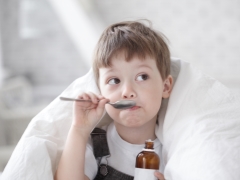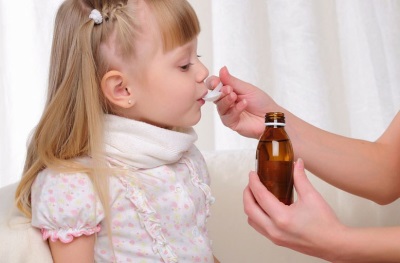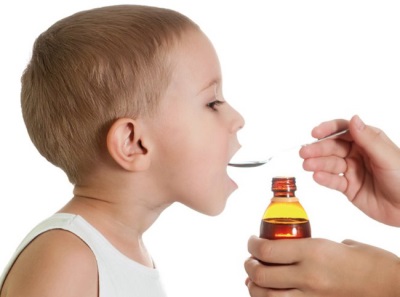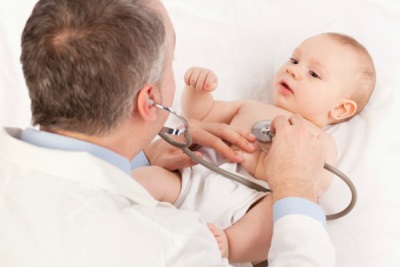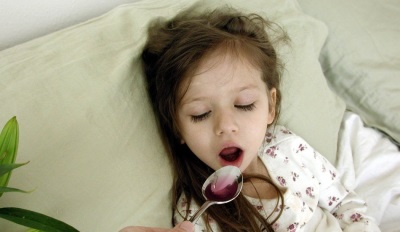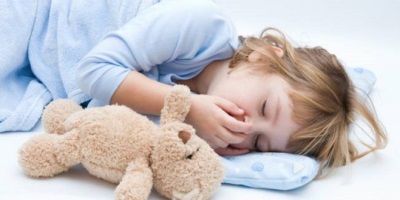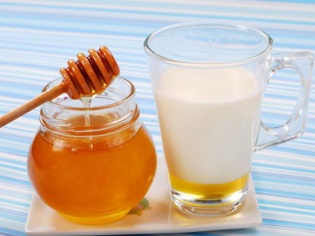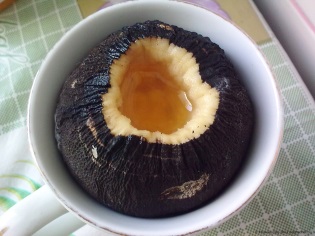Expectorants for cough for children
Cough is a common symptom of disease, so all parents experience this manifestation of ARVI, bronchitis or another disease in a child. To alleviate the condition of the baby, they resort to both folk remedies and medicines. One of the most common groups of drugs used in coughing in children is expectorants drugs.
What is it?
To expectorant drugs include agents that promote the removal of sputum due to its liquefaction and easier coughing. Expectorant remedies are herbal and synthetic. They are prescribed for acute respiratory infections, pneumonia, bronchitis, bronchial asthma.
An indication for the use of expectorant drugs is a wet cough, in which sputum is not viscous and not thick (with too viscous secretions, the baby is prescribed mucolytics).
Expectorant drugs are represented by different dosage forms. In childhood, the most in demand are sweet syrups and powders that are diluted in water. Also, children are given lozenges, drops and pills. Some expectorant drugs are produced in the form of solutions for inhalation.
Operating principle
Funds from the group of expectorant drugs may act as follows:
- Reflex stimulate the production of mucus, peristalsis of smooth muscles of the bronchial tree and the activity of epithelial cells through irritation of the gastric mucosa, as a result, the mucus is better separated and excreted from small bronchioles into large bronchi and trachea. A similar effect is typical for herbal preparations, for example, on the basis of licorice root, thyme or althea.
- Directly irritate the bronchial mucosa in order to increase the production of liquid mucus. Such an effect is noted in sodium and potassium iodides, sodium bicarbonate, anise essential oils and other means. Nowadays, they are used less frequently than drugs with a reflex effect.
Expectorant drugs by age
In the appointment of any drug, including drugs from the group of expectorant drugs, it is important to consider the allowable age of use.
For babies
Children younger than one year old are allowed to give ivy-based preparations (GedelixProspan Herbion) or Althea. There are no preservatives and alcohol in these drugs, so they are safe for babies. From six months you can use Linkas.
From 1 to 3 years
Children older than a year are often given syrups. plantain, eg, Herbion or Dr. Theiss. Also from 1 year allowed the use of Tussamag - a drug containing thyme extract. At this age, the child can also be given syrups containing ivy or marshmallow.
Above 3 years old
The list of approved expectorant for children of this age is expanding. Three-year-old with a wet cough can be given syrup Pertussin, which contains thyme extract supplemented with potassium bromide. Also, from the age of 3 they start to write out syrup from 11 plants Dr. Mom and pills Mukaltin.
How to treat: a review of the best expectorant syrups, tablets and mixtures
Name / Form / Age | Instructions for use |
Herbion ivy syrup (since birth) | Children of the first year of life are given 2.5 ml twice a day. Children 1-6 years old give the drug three times a day for 2.5 ml, at the age of 6 to 10 years a single dose is 5 ml of syrup, and from 10 years - 7.5 ml. The duration of treatment is 1 week. |
Plantain Herbion Syrup, Primrose Herbion Syrup (since 2 years) | Children 2-7 years old give 5 ml of syrup three times a day, and at the age of seven, a single dose is increased to 10 ml. The drug should be washed down with warm water or tea. |
Gedelix syrup (since birth) | Children 0-10 years give 2.5 ml of the drug at one time. At the age of one year, the medicine is prescribed once a day, for children 1-4 years old - three times a day, for children from 4 to 10 years old - 4 times a day. From 10 years a single dose is 5 ml, and the frequency of use - 3 times a day. Take the syrup after meals. Drink it is recommended for at least 7 days. |
Alteyka syrup (since 2 years) | The drug is drunk before meals 4-6 times during the day. At the age of 6 years a single dose (5 ml) is diluted in 10-15 ml of water. A single dose for 6-14-year-old children is 10 ml. |
Licorice Root Syrup (since birth) | To children of the first year of life, 1 drop of syrup is diluted in a dessert spoonful of water. Children 1-2 years old give 1-2 drops of syrup, diluted in water. Children over 2 years to 12 years of age are prescribed in half a teaspoon, and children over 12 years old - in a teaspoon of the drug (diluted with syrup in a quarter cup of water). The multiplicity of reception - 3 times a day. The duration of treatment is from 7 to 10 days. |
Ascoril syrup (from 1 year) | The drug is given three times a day, 30-60 minutes after meals, 5 ml at the age of 1 to 6 years and 5-10 ml at the age of 6-12 years. The drug should not be washed down with alkaline liquids. |
Prospan syrup (since birth) | Children of the first year of life are given 2.5 ml twice a day, and for children 1-6 years old, the same single dose three times a day. From 6 years a single dose of 5 ml of syrup. The duration of treatment is 1 week. |
Dry Cough Syrup for children, powder in bags and in a bottle 200 ml (from birth) | The powder in the bottle is diluted with boiled chilled water, pouring it to the mark. The portion bag is dissolved in 15 ml of water. Take the medicine 3 to 4 times a day after meals. A single dose in the age of up to the year is 15-20 drops of the mixture, at the age of 1-2 years - 40 drops. Children of 3–4 years old are given half a spoon of the medicine, at the age of 5–6 years old — 2/3 spoon, at 7–8 years old — by spoon. At 9–12 years old - 2 tsp , and from 12 years old - a tablespoon. |
Mukaltin tablets (from 3 years) | For young children, the tablet can be crushed into powder and dissolved in warm water. Older children need to chew a pill. The drug is taken 3-4 times a day before meals. At the age of 3-12 years, a single dose is from half to a full pill. Children over 12 years old are given a whole tablet. Duration of use - from 5 to 7 days. |
Plantain Syrup Doctor Tayss (from 1 year) | The syrup is drunk at the age of 1-6 years every 3-4 hours at 2.5 ml, and from 6 years of age - every 2-3 hours at 5 ml. The medicine is washed down with water in a small amount. |
Tussamag syrup and drops (from 1 year) | The drug can be taken undiluted, add water to it or drip onto the sugar. The drug in the drops for children 1-5 years give 10-25 drops from 2 to 3 times a day, and for children over 5 years old - from 20 to 50 drops three times a day. The drug in syrup is given 2-3 times a day, 5 ml at the age of 1 to 5 years, and children over 5 years old - 3-4 times a day, 5-10 ml. |
Travisil tablets (from 6 years) | The drug is prescribed three times a day for 2-3 weeks. Children 6-12 years old should dissolve 1 tablet, and over 12 years old - 1-2 tablets. |
Pertussin syrup (from 3 years) | The drug is given three times a day in a dose of 5 to 10 ml. |
Syrup Dr. Mom (from 3 years) | The drug is prescribed for 2-3 weeks three times a day. In 3-5 years a single dose is 2.5 ml, and for children over 6 years old - from 2.5 to 5 ml. |
Amtersol syrup (from 3 years) | The medicine is given three times a day after meals for 10-14 days. Children of 3-6 years old are prescribed 1/2 teaspoonful, in 6-12 years old - full teaspoonful, and over 12 years old - one dessert spoon. |
Linkas syrup (from 6 months) | Up to 3 years of age a single dose is 2.5 ml, at the age of 3 years - 5 ml. Children up to 8 years old give the drug three times a day, and from 8 years old - 4 times a day. Duration of use - from 5 to 7 days. |
What drugs are needed for wet cough?
If a child has a wet cough, he is shown drugs with expectorant action, which will not block the cough, but will help remove the excess mucus in the bronchi. Such action has drugs based on Althea, plantain, thyme, thyme and other plants used in the treatment of cough.
Effective remedies for strong coughing without fever.
If the child has a strong cough, but there is no fever or other symptoms of acute respiratory viral infections, it is likely that the nature of this cough is allergic. The cause of its appearance can be allergens in food, household allergens or pollen of plants.
To ensure that a strong cough is caused by allergies, and not lung diseases, it is important to consult a pediatrician. After the examination, the doctor will prescribe a small antiallergic remedies that will eliminate the cough.
Opinion Komarovsky
A popular pediatrician treats expectorant positively, but believes that their effectiveness is comparable to the non-drug methods that are available to every mother. When coughing a child, Komarovsky urges to pay attention to a sufficient amount of drinking and access to fresh air to the child. The doctor says that it is no less effective to dilute the sputum and improve its separation than syrups and potions.
If the child is wrapped up and kept in an unventilated room with dry air, this will only increase the cough and worsen the child's condition.
Komarovsky advises to moisten the air in the room and reduce the viscosity of sputum due to abundant drinking. Also, a well-known doctor recommends walking with the child (in the absence of fever), because when coughing, fresh air is very important for quick recovery.
About what means prescribed for coughing, see the transfer of Dr. Komarovsky.
Tips for choosing a drug
When choosing one of the expectorant drugs, parents should remember that coughing is just a symptom. However, it often performs a protective function, eliminating the children's body from excess mucus in the respiratory tract, along with which bacteria and viruses are removed.
In addition, the occurrence of cough may be associated with many other diseases, for example, allergies or infection with worms. That is why it is best to treat cough with the help of a pediatrician. The doctor will carefully examine the child, listen to the lungs and select the most appropriate means.
Parents in no case should not give the child the means to suppress the cough reflex, and also combine them with expectorant drugs. This can lead to stagnation of sputum in the lungs and the deterioration of the child's condition, up to the need for urgent hospitalization.
Folk remedies
Traditional medicine advises to use for better expectoration of sputum different chest fees. In these collections you can see the marshmallows, chamomile, plantain, calendula, licorice, mother and stepmother, oregano, mint, wild rosemary and other herbs. Collection brew, insist and give the child to drink when you cough. Other popular folk recipes are:
- Milk and honey. Heated 250 ml of milk, add to it Art. spoon of honey, 5 g of butter and half a tsp of soda. Let's drink on an empty stomach in the morning and before bedtime in the evening.
- Radish and honey. Wash medium-sized black radish, make a recess in it, into which pour a teaspoon of honey. After 4 hours, drain the resulting syrup and give the child a tsp up to 7 times a day.
What to do if cough is in the advanced stage?
If the cough hurts a child for a long time and no folk methods do not help, be sure to show the baby specialist. He will find out the reason for the prolonged cough and prescribe the necessary treatment, which will soon ease the child's condition.
